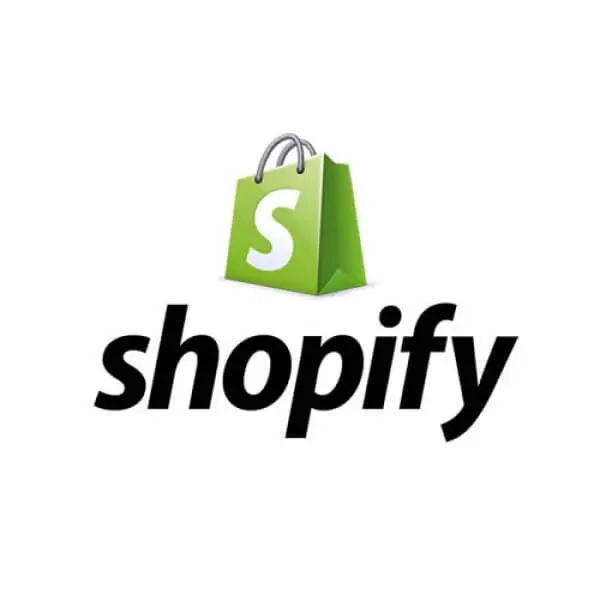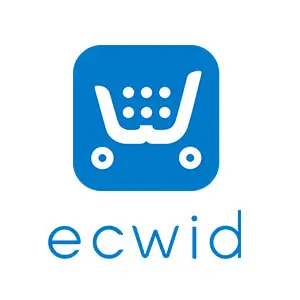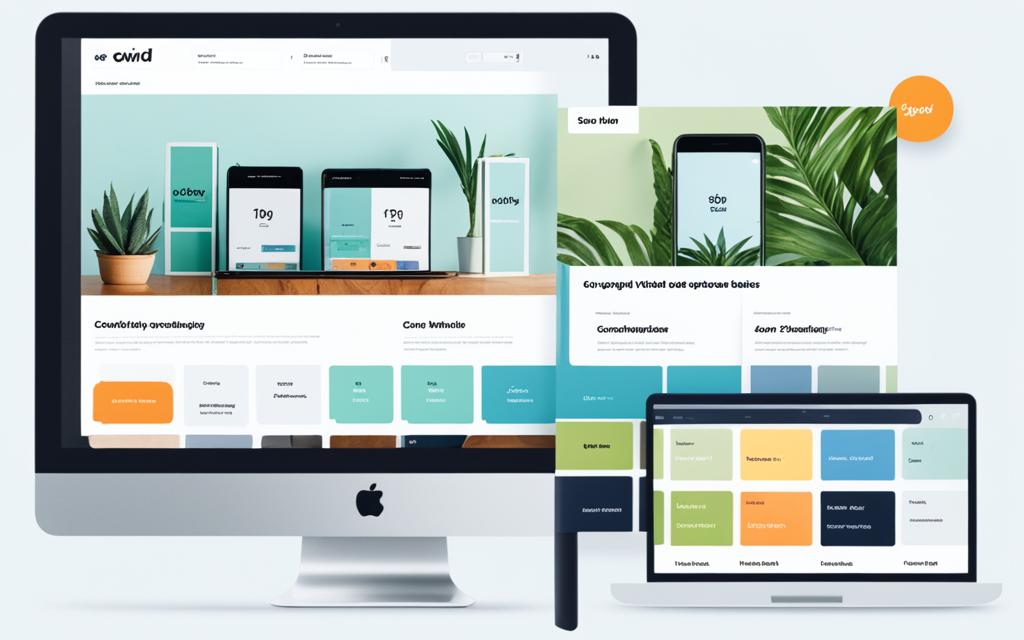Whether you’re launching an ecommerce store or a side gig, Ecwid and Shopify are two of the top options to consider for your online business.
Both ecommerce platforms deliver a full suite of tools to sell anywhere, including an online store, social media sites, seller marketplaces, retail stores and mobile venues.
This comprehensive comparison will explore how Ecwid and Shopify stack up in terms of pricing, features, ease of use and more to help you determine the best fit for your ecommerce needs.
Let’s get into it.
Ecwid vs Shopify: At a Glance
Shopify and Ecwid are both ecommerce platforms that enable users to sell products online.
Shopify is a popular ecommerce platform established in 2006. It is designed for users who want to create a standalone online store on a domain of their choice.
It offers a wide range of features, apps, and integrations, making it suitable for selling physical and digital products. It provides various pricing plans, allowing scalability but generally involves higher upfront costs.
Ecwid, launched in 2009, is another ecommerce player that focuses on adding ecommerce functionality to existing websites.
Try Shopify free followed by first month at just $1. No credit card required. Limited Time Offer.
It allows users to sell products on platforms like WordPress, Wix, Weebly, and more, without the need to migrate to a new website platform.
Ecwid offers an Instant Site builder for users without an existing website, making it easy to start selling online. It provides a free plan and is known for its ease of use and flexibility in embedding ecommerce capabilities.
Also Read: Is Shopify Good For Dropshipping?
Ecwid vs Shopify: Key Features
Both Ecwid and Shopify provide robust product management tools, allowing you as a merchant to create detailed product pages with images, videos, variations, and sale prices.
Additionally, these platforms support comprehensive inventory management, with Ecwid offering product limits on lower-tier plans and Shopify providing unlimited products on all plans.
Product Management & Inventory
The and capabilities of these ecommerce platforms enable you to effectively manage your product catalog, including the ability to upload product details, track inventory levels, and apply discounts or sale prices as needed.
While Ecwid’s lower-tier plans may have limitations on the number of products you can list, Shopify offers with unlimited product listings across all of its plan options.
Also Read: Does Ecwid Work With Webflow?
Order Processing & Fulfillment
Streamlining the order processing and fulfillment workflow is a crucial aspect of running a successful ecommerce business.
Both and platforms provide features like automated order confirmation emails, integrated shipping label printing, and order tracking to help you efficiently manage for your customers.
Furthermore, Shopify offers additional tools such as Shopify Shipping and Shopify Fulfillment Network, which can further assist you in managing the logistics of your ecommerce operations.
Payment Gateways & Options
Integrating with reliable and secure payment gateways is essential for any online store. Ecwid and Shopify both offer a wide range of popular payment gateway options, including PayPal, Stripe, Square, and Authorize.net.
Additionally, Shopify provides its own payment processing solution, Shopify Payments, which can help you avoid additional transaction fees when using a third-party gateway for.
Ge free FOREVER plan. Set up your free account once, and keep it as long as you like.
Also Read: Is Ecwid Safe?
Sales Channels & Multi-Channel Integration
When it comes to ecommerce, diversifying your sales channels is key to reaching a wider audience and boosting your online visibility.
Both Ecwid and Shopify offer a range of options to help you sell your products and services through various online platforms, social media networks, and in-person channels.
Online Stores & Websites
Both Ecwid and Shopify allow merchants to create their own online stores. Ecwid offers the ability to add an ecommerce store to existing websites and blogs on platforms like WordPress, Wix, and Squarespace, which is ideal for a multi-site sales strategy.
Shopify, on the other hand, is primarily focused on building standalone online stores, but also supports selling through other websites and blogs.
Try Shopify free followed by first month at just $1. No credit card required. Limited Time Offer.
Social Media Integration
Ecwid and Shopify both enable merchants to sell on various social media platforms, including Facebook, Instagram, Pinterest, and TikTok.
The multichannel integration allows businesses to reach a wider audience and provide a seamless shopping experience for customers across different channels, driving social selling opportunities.
Check Out: Best Ecwid Dropshipping Apps
Marketplaces & Online Selling Platforms
In addition to online stores and social media, Ecwid and Shopify allow merchants to sell on popular online marketplaces, such as Amazon, eBay, and Etsy.
This helps expand the reach of your ecommerce business and tap into the large customer bases of these platforms, further enhancing your marketplace selling capabilities.
Mobile & In-Person Sales
Both Ecwid and Shopify support in-person sales through mobile point-of-sale (POS) systems.
Ecwid’s higher-tier plans include mobile POS functionality, as well as the ability to connect to retail POS systems like Vend, Square, and Clover.
Shopify also offers mobile POS capabilities in all of its store plans, with the option to add Shopify POS Pro for advanced in-store features, enabling you to seamlessly integrate your online and offline sales channels.
Ge free FOREVER plan. Set up your free account once, and keep it as long as you like.
Website Builder & Design Customization
When it comes to building your online store, both Ecwid and Shopify offer comprehensive website builder tools to help you create a visually appealing and functional ecommerce presence.
Ecwid’s Website Builder and Templates
Ecwid’s website builder, known as the Instant Site, provides a basic but user-friendly option for creating an online ecwid website builder.
The platform offers over 30 mobile-responsive ecwid website templates, and the recent New-Gen Instant Site update has improved the customization options, allowing merchants to build a custom homepage and site pages using content blocks.
However, Ecwid still lacks more advanced content creation features, such as a built-in blog.
Shopify’s Website Builder & Theme Customization
Shopify’s website builder is widely regarded as one of the best in the ecommerce industry. The platform offers over 100 free and paid shopify website themes, with the paid options ranging from $180 to $350.
Shopify’s recent OS 2.0 upgrade has significantly improved the theme customization experience, providing merchants with a user-friendly drag-and-drop editor and the ability to customize nearly all pages of their ecommerce website design, including a built-in blog.
Ecwid vs Shopify: Ease of Use & User Experience
Both Ecwid and Shopify are known for their beginner-friendly interfaces and user-friendly experiences.
Ecwid is often considered the more straightforward option, especially for those looking to add an ecwid ease of use ecommerce store to an existing website or blog.
Try Shopify free followed by first month at just $1. No credit card required. Limited Time Offer.
Shopify, on the other hand, may require a slightly steeper learning curve, but offers a more robust and customizable platform for building a standalone online store, providing a seamless shopify ease of use and overall ecommerce platform user experience.
Marketing & SEO Features
Ecwid and Shopify both offer robust marketing and SEO tools to help you optimize your online presence and drive more traffic and sales.
Email Marketing Integration
Both Ecwid and Shopify provide built-in email marketing tools, enabling you to create and send targeted campaigns to your customer base.
Ecwid’s paid plans include abandoned cart emails with coupon offers, helping you recover lost sales.
Shopify, on the other hand, offers email marketing campaigns and workflows across all of its plans, making it easier to stay in touch with your customers and nurture relationships.
SEO Tools & Optimization
When it comes to search engine optimization, Ecwid offers basic SEO tools, such as customizable meta tags and URLs.
However, the platform’s flexibility allows you to take advantage of the SEO-friendly features of other platforms like WordPress, Squarespace, and Wix when integrating Ecwid into your existing website.
Shopify’s built-in SEO tools are more limited, but you can expand their capabilities through various apps and integrations.
Also Read: Shopify vs Wix
Social Media Marketing
Both Ecwid and Shopify enable you to sell directly on popular social media platforms like Facebook and Instagram, creating seamless social commerce experiences for your customers.
The platforms also provide tools for developing and managing social media marketing campaigns, helping you drive more traffic and sales through these influential channels.
Ge free FOREVER plan. Set up your free account once, and keep it as long as you like.
Extensions, Apps, & Third-Party Integrations
Ecwid
While Ecwid comes with a robust set of built-in features, the platform also offers an Ecwid App Market which provides access to various third-party extensions and integrations to expand the functionality of your ecommerce store.
These apps cover a wide range of categories, from marketing and SEO to customer service and inventory management.
The Ecwid App Market enables merchants to enhance their online stores with a variety of tools and services.
From digital marketing apps to customer engagement solutions, the Ecwid App Market offers a comprehensive selection of integrations to help you streamline your operations and provide a better shopping experience for your customers.
Try Shopify free followed by first month at just $1. No credit card required. Limited Time Offer.
Shopify App Store
Shopify’s App Store is significantly larger than Ecwid’s, with over 3,000 apps available to extend the platform’s capabilities.
The Shopify App Store covers a comprehensive range of ecommerce features, from sales and marketing to finance and security.
While many apps offer free plans or trials, some require paid subscriptions to access all the features.
Customer Support & Resources
Both Ecwid and Shopify understand this need, offering a range of support options and educational materials to assist their customers.
Also Read: Shopify vs Storyblok
Ecwid
Ecwid provides customer support via email, live chat, and phone, with the availability of phone support depending on the subscription plan.
The platform also offers a comprehensive knowledge base, community forums, and tutorials to help merchants troubleshoot issues and learn how to use the Ecwid platform effectively.
Whether you need assistance with setting up your online store, managing your products, or optimizing your sales channels, Ecwid’s customer support team and educational resources are available to guide you through the process.
Shopify
Shopify takes customer support a step further, offering 24/7 assistance via email, live chat, and phone across all of its plans.
The platform also provides a robust knowledge base, community forums, and various educational resources to help merchants succeed on the Shopify platform.
From step-by-step guides to video tutorials, Shopify ensures that its users have the tools and support they need to build, manage, and grow their ecommerce businesses.
Community Resources & Documentation
In addition to the support offered by Ecwid and Shopify, both platforms have active communities of merchants, developers, and experts who share insights, tips, and best practices.
These communities provide a wealth of information and support for users, helping them navigate the ever-evolving landscape of ecommerce.
The platforms also offer comprehensive documentation to guide merchants through various aspects of setting up and managing their online businesses, from product listings and inventory management to marketing and analytics.
Pricing Plans & Cost Comparison
When evaluating Ecwid and Shopify as potential ecommerce platforms, it’s important to understand their respective pricing structures and any additional costs involved.
Both platforms offer flexible subscription plans to accommodate businesses of various sizes and budgets.
Ecwid’s Pricing Structure
Ecwid offers a free plan that allows you to list up to 10 products with its Instant Site.
The paid Ecwid plans include the Venture plan at $21 per month, Business plan at $39/month, and the Unlimited plan at $89 per month, with the main differences being the number of products you can list and the sales channels you can access.
These are annual payment plans that save you 16% compared to monthly payment plans.
Ecwid’s higher-tier plans enable multichannel selling on platforms like Facebook, Instagram, Amazon and eBay, as well as in-person sales via mobile POS. Ecwid also offers a 25% discount when you pay annually.
Ge free FOREVER plan. Set up your free account once, and keep it as long as you like.
Shopify’s Pricing Structure
With Shopify, you can get started for free. You then get to enjoy the first month at just $1.
In addition, Shopify offers four subscription plans:
- Basic – $29/mo
- Shopify – $79/mo
- Advanced – $299/mo
- Plus – $2300/mo
With monthly payment plans, you will have to shell out 25% more.
Shopify also charges transaction fees on third-party payments, ranging from 0.6% to 2%.
Additional Costs & Fees
In addition to the monthly subscription fees, both Ecwid and Shopify have additional costs to consider.
For Ecwid, these include fees from third-party providers for credit card processing, shipping labels and retail POS systems, as well as the cost of a custom domain name.
Shopify also charges transaction fees if you use a third-party payment gateway instead of Shopify Payments, as well as additional fees for Shopify Shipping labels, Shopify POS Pro, and advanced store themes.
Explore: Shopify vs Systeme
Conclusion
Ecwid is a great option for those looking to add ecommerce functionality to an existing website or blog, while Shopify excels at building standalone online stores with a more robust set of features and customization options.
Ultimately, both ecwid vs shopify platforms are capable of supporting a wide range of ecommerce businesses, and the decision should be based on a careful evaluation of your requirements and the unique strengths of each platform.
By understanding the strengths and limitations of each platform, you can make an informed decision that will set your ecommerce venture up for long-term success.

















